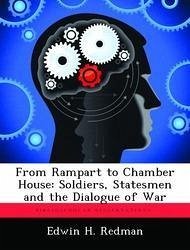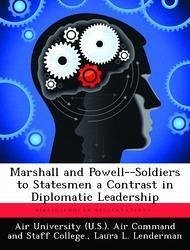Nicht lieferbar

From Rampart to Chamber House: Soldiers, Statesmen and the Dialogue of War
Versandkostenfrei!
Nicht lieferbar
The relationship between political and military leadership in times of conflict is as crucial today as ever. In the face of limited warfare, counterinsurgency, and peacekeeping operations, it is imperative that soldiers and statesmen employ the most appropriate means of communication while applying military power to achieve political ends. This thesis seeks to determine the best construct for civil-military dialog. It examines the frameworks presented by three renowned thinkers: Carl von Clausewitz, Samuel P. Huntington, and Eliot Cohen. Clausewitz maintains that, because war is an extension o...
The relationship between political and military leadership in times of conflict is as crucial today as ever. In the face of limited warfare, counterinsurgency, and peacekeeping operations, it is imperative that soldiers and statesmen employ the most appropriate means of communication while applying military power to achieve political ends. This thesis seeks to determine the best construct for civil-military dialog. It examines the frameworks presented by three renowned thinkers: Carl von Clausewitz, Samuel P. Huntington, and Eliot Cohen. Clausewitz maintains that, because war is an extension of policy, both dialog and action must be two-way, even to the extent that the soldier become a statesman during war. Huntington disagrees; he views the camps as distinct, due to narrow areas of expertise and the necessity for the military to remain professional by limiting political oversight and forbidding acts of policy by generals. Cohen's model allows for regular and liberal participation by the civilian leader into the military realm, not vice versa. He argues that the political situation is continually changing and that generals are not equipped to understand the complexities of the strategic environment beyond the conduct of actual war. By examining each in light of historical examples, the author measures the merit of the theories. The case studies presented are Winston Churchill's decision to move British fighters into France in the summer of 1940, the actions of General George C. Marshall as Chief of Staff of the U.S. Army during World War II, and the civil-military deliberations during the build up to Operation Allied Force in 1999. The case studies demonstrate that each theory is both validated and repudiated in some respect by history. The author also proposes a fourth option that includes the positive aspects of Clausewitz, Huntington, and Cohen.












